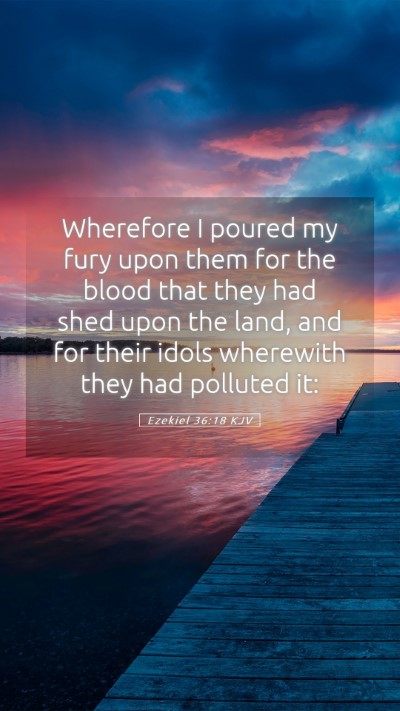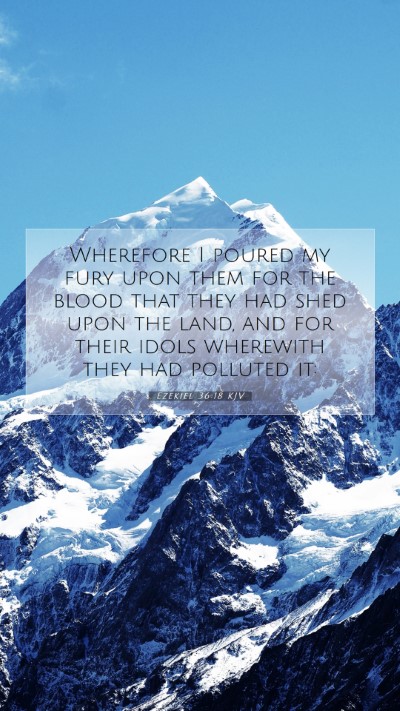Ezekiel 36:18 - Bible Verse Meaning and Interpretation
Bible Verse: Ezekiel 36:18
Verse: "So I poured out my fury upon them for the blood that they had shed upon the land, and for their idols wherewith they had polluted it."
This verse encapsulates the intense emotions and judgments of God upon the nation of Israel due to their transgressions. Here we will explore the depth of this scripture through bible verse meanings, bible verse interpretations, and bible verse explanations, drawing from the insights found in public domain commentaries.
Contextual Understanding
Ezekiel 36:18 occurs within a chapter that emphasizes the restoration of Israel. Prior verses discuss the retribution for Israel’s sins and their current state of exile. Understanding this context is crucial for proper bible verse commentary and scripture analysis.
Commentary Insights
-
Matthew Henry's Commentary
Henry stresses that God’s fury is directed towards the bloodshed and idolatry that defiled the land. These elements signify a breach of both moral and covenantal laws. God’s anger is not arbitrary but is a response to Israel's persistent sinfulness, highlighting the significance of repentance and the consequences of turning away from divine commands.
-
Albert Barnes' Notes
Barnes notes that this passage reflects God’s divine justice. The mention of "blood" indicates the serious nature of sin committed and how it corrupts both individuals and the community. God’s punishment serves both as retribution and a call to return to righteousness, aligning with his overall purpose for restoration and holiness among His people.
-
Adam Clarke's Commentary
Clarke provides a thorough historical backdrop to the exile and the worship practices that led to God's judgment. He elucidates that purification of the land is necessary for a true restoration, which will only come once the people renounce their idolatrous ways. This thematic focus on cleansing mirrors broader biblical themes of sanctification and renewal.
Theological Implications
The examination of Ezekiel 36:18 reveals profound bible study insights. God’s wrath reflects His holiness and intolerance of sin. The subsequent promise of restoration illustrates that even in judgment, hope exists through repentance and a return to God. This understanding is crucial for anyone engaging in bible study groups or pursuing online bible study.
Application and Significance
For contemporary believers, the implications of Ezekiel 36:18 extend beyond historical narrative. The challenges of idolatry and bloodshed resonate within modern contexts, urging a reflective examination of personal and communal practices. Addressing these themes is essential in facilitating meaningful bible study lessons and discussions.
Cross References
- Leviticus 17:4 - The significance of blood and sacrificial practices.
- Deuteronomy 12:31 - God’s command against idolatry.
- Isaiah 59:3 - The barriers of sin between God and people.
Conclusion
In summary, Ezekiel 36:18 invites readers into a deeper understanding of Scripture while highlighting the necessity of repentance to escape divine judgment. As we interpret this verse, it is clear that studying difficult Bible passages like these can significantly enrich one's faith and enhance personal growth. By applying these lessons to daily life, we cultivate a closer relationship with God, reaffirming His sovereignty and holiness.
Further Study and Resources
For those interested in delving deeper into the themes of this verse, consider exploring bible study tools and bible study resources that focus on Old Testament prophecies and the nature of divine judgment. Engaging with diverse bible study materials and the historical context can illuminate the timeless truths found in scripture.


